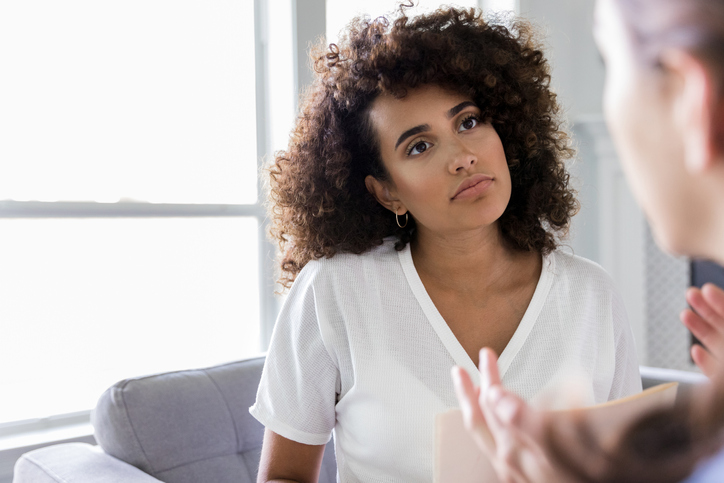
Source: SDI Productions / Getty
More and more, women are choosing to freeze their eggs to extend their fertility windows, and increase their chances of having a viable pregnancy later in life. While the practice is growing in popularity, with celebrities like Chrissy Teigen, Meagan Good, Angela Rye, and Michaela Coel undergoing it, there’s still much to learn about the egg freezing process and everything it entails. The average person is probably unaware of the best age to start freezing her eggs, or what constitutes a good antral follicle count.
What’s more, there are several myths and misconceptions about egg freezing. First, it’s not painful, though patients could feel some slight discomfort after the egg retrieval procedure. “There may be some light cramping and a sensation of bloating/fullness which can be treated with over-the-counter pain medication,” says Lucky Sekhon, M.D., a fertility specialist and board-certified ob-gyn from New York City. “These symptoms will subside fully for most patients within days.”
And you can still get pregnant naturally after freezing your eggs. “You can naturally conceive after freezing eggs,” says Rachel A. McConnell, M.D., fertility specialist at Columbia University Fertility Center. Every month, eggs are recruited for development, and one egg is usually selected for ovulation.
Ahead, we talked with four fertility specialists who share everything you should know about the egg freezing process, from the success rate to whether you can get pregnant naturally after having the procedure. Read on for more.
What is egg freezing?
Egg freezing is the process of preserving a woman’s eggs so she can have a viable pregnancy at a later date. “It involves stimulating, extracting, freezing, and storing your eggs,” says Jane L. Frederick, M.D., reproductive endocrinology and infertility specialist.
When you’re ready to pursue pregnancy, “your eggs can be thawed and fertilized with your partner’s sperm in order to create embryos,” explains Frederick. “An embryo can then be transferred into your uterus in the hope of achieving a healthy and successful pregnancy.”
To begin the process, you’ll receive hormonal injections to “stimulate your ovaries to grow multiple eggs at the same time.” The doctor will then use blood tests and ultrasounds to monitor your body’s response over the course of 10 days, says Frederick.
“Once the eggs look ‘ready’ based on hormone levels and ultrasound findings, they are then extracted under anesthesia through a very short outpatient procedure.”

Source: JGI/Jamie Grill / Getty
How successful is egg freezing?
The success of egg freezing depends on a variety of factors. “It will vary due to the woman’s age at the time of freezing, and the freezing technique that is used,” says Rachel A. McConnell, M.D., a fertility specialist at Columbia University Fertility Center.
Sekhon adds that the number of mature eggs that you end up freezing matter, because not every egg will become an embryo. “There is a lot of drop-off and attrition from the egg to embryo stage,” she explains. “Not every egg fertilizes with sperm and turns into an embryo, and not every resulting embryo is healthy or genetically normal.”
Freezing a high number of eggs ensures that if you lose a few along the way, there will still be enough healthy embryos to use later on. While there is no exact number of eggs that can guarantee a viable pregnancy, “freezing 20 to 30 eggs would increase the probability of success,” says Frederick.
“Pregnancy rates approach 50% to 60% in good prognosis patients,” Frederick explains. And the pregnancies aren’t more dangerous because of the egg freezing process. “The technology is thought to be quite safe and has not been associated with an increased risk of birth defects, chromosomal abnormalities, or pregnancy complications compared to pregnancies derived from fresh eggs.”
At what age should you freeze your eggs?
There’s no specific age for freezing eggs, but doctors tend to think before you reach 35, or when you’re in your 20s and 30s, is ideal. “At this age, you have the advantage of preserving a good number of eggs of good quality,” says McConnell. “Women who are older will typically produce a lower number of eggs, and a higher number of the eggs will not be chromosomally normal.”
While Sekhon acknowledges that “egg quality is never perfect,” she breaks down how it changes as the years progress. “Women are born with all the eggs they will ever have, so the younger you freeze, the more eggs can be accessed in any given egg freezing cycle. It’s at its best in your 20s, but even then, if all eggs were turned into embryos, we would expect 25% of those embryos to have genetic errors like the wrong number of chromosomes.”
That proportion rises with age, and increases significantly once a woman is over the age of 35, according to Sekhon. “Then by the time a woman is 38 or 39 years old, we expect 50% of any embryos resulting from her eggs to have the wrong number of chromosomes. Beyond age 40, we see 60% to 70%, or more being abnormal,” she says. If an embryo is abnormal, it’s likely they won’t implant, or if they do implant, it may result in a miscarriage.
But that doesn’t mean all hope is lost. “The older a patient is and the more compromised the egg quality, the more eggs should be frozen, to improve the odds of success,” says Sekhon.
McConnell adds that physical health also plays a significant role. “If a woman is stressed, a smoker, or obese, then discontinuing the use of cigarettes, weight loss, and stress management may improve her egg freezing outcome,” she explains.

Source: SDI Productions / Getty
Is egg freezing painful?
No, it’s not painful, but there are a few side effects that can cause discomfort. “It’s a process that requires ovarian stimulation using injectable hormonal medication,” McConnell says. “After the stimulation process, eggs are aspirated vaginally while under a light sedation. After the procedure, mild pain may be noted, but usually controlled with over-the-counter pain reliever medications, such as Tylenol or Ibuprofen.”
Some people do express discomfort with the injectable medications. “The ovaries must be stimulated, using 8 to 10 days of injectable medications, to mature the eggs that are available in that given cycle,” says Sekhon. “The injections involve small, thin-caliber needles which are used to inject hormones once or twice per day. During the course of these injections, patients come in for close monitoring every couple of days — a quick ultrasound and blood work visit to monitor their response to treatment.”
When the eggs are retrieved after the injectable medication process is over, it’s done under light sedation. “The egg retrieval procedure does not hurt, because it is done while a patient is asleep,” says Sekhon. “It takes only 5 to 10 minutes, since the ovaries are easily accessible, using a long, thin needle that passes through the vaginal wall. Once the procedure is over, the patient is discharged home after being monitored for 30 to 60 minutes. There may be some light cramping and a sensation of bloating/fullness which can be treated with over-the-counter pain medication. These symptoms will subside fully for most patients within days.”
Can you get pregnant naturally after freezing your eggs?
Yes, you can get pregnant naturally after freezing your eggs. Egg freezing won’t change your egg count or your fertility status. “Every month, eggs are recruited for development and one egg is usually selected for ovulation,” says McConnell.
Does freezing eggs stop periods?
The egg freezing process won’t stop your period. “The egg freezing process takes about 12 to 14 days, which usually starts on the second or third day of your period,” McConnell explains. “After your eggs are retrieved by a minor outpatient procedure, about two weeks later your period should return.”
What is AMH? What is a good AMH level?
AMH is shorthand for the anti-Mullerian hormone, which doctors use to determine a woman’s egg count. A good AMH level depends on your age, says Sekhon. “In general, an AMH level of 1-1.2ng/ml is considered the threshold, below which we would consider a woman to have ‘diminished ovarian reserve,’ or a low egg count. But it’s all relative. While a 1.5ng/ml would be considered normal or ‘good’ for a 40-year-old, it would be relatively low for a woman in her 20s,” she explains.

Source: AJ_Watt / Getty
How can you increase AMH levels?
Unfortunately, you can’t increase your AMH levels. But Sekhon does acknowledge that “sometimes, the AMH level can be falsely suppressed due to long-term birth control use. In these cases, stopping birth control for a few months and retesting the AMH level may reveal higher levels.”
Can you still get pregnant with low AMH?
Yes, women with low AMH levels can still get pregnant. “A low AMH level indicates that your egg count is low, but it does not mean the egg quality is low,” says McConnell.
What is FSH? What is a normal FSH level to get pregnant?
FSH is the follicle-stimulating hormone which helps control a woman’s menstrual cycle and stimulate egg growth. Menopause is confirmed when a woman’s FSH level is consistently at 30 mIU/mL or higher, and she hasn’t had her period for 12 months. Despite the association with menopause, “there is no normal FSH level to get pregnant,” says Sekhon. “Women in premature menopause with very high FSH levels can conceive via a sporadically ovulated egg, as long as the quality of the egg is normal and intact.”
What is a good follicle count?
While noting that a good follicle count is relative, Sekhon explains that, “the threshold of 8 total follicles is used, where having less than 8 follicles on the antral follicle count signifies diminished ovarian reserve.” The follicle count provides an estimate of how many eggs can be “stimulated and retrieved in a given egg freezing cycle.”

Source: PeopleImages / Getty
What is a good antral follicle count?
A good antral follicle count is also tied to a woman’s age. “It is normal for the follicle count to decrease as women age,” says Karine Chung, M.D., of California Fertility Partners. “In general, for women over 35, I am happy to see 10 to 12 antral follicles per ovary. For women 40 and above, I am happy if I see about 6 antral follicles on each side.”
“Antral follicle count is a helpful predictor of how a woman’s ovaries may respond to the egg freezing or IVF process, both of which depend on our ability to convince the ovaries to ovulate multiple eggs within on month,” Chung says, adding, “in a natural menstrual cycle, only one follicle will ovulate an egg.”
What is a good follicle count for IVF?
There’s no specific number that’s an ideal follicle count for IVF, says McConnell. “Other factors that are important will be how many mature follicles, mature eggs, and quality of the eggs will be the most important factor for a successful outcome.”
RELATED STORIES:









